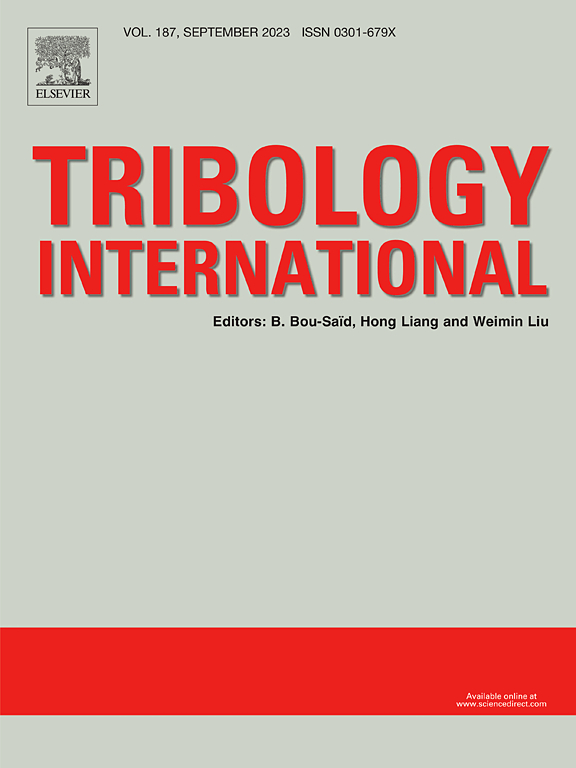残余应力对镍基超合金高温摩擦学性能的影响
IF 6.1
1区 工程技术
Q1 ENGINEERING, MECHANICAL
引用次数: 0
摘要
本研究介绍了一种利用材料热膨胀系数差异产生残余压应力的方法。还开发了相应的实验装置。利用这种方法,实验研究了残余压应力对镍基超级合金 Ni16Cr13Co4Mo 摩擦学特性的影响。结果表明,残余应力会显著影响超合金的摩擦行为和耐磨性。在中等残余压应力下,摩擦系数和磨损率的稳定时间达到最小值。适度的残余压应力可促进三氧化层的形成并增强其与基体的结合强度,从而缩短摩擦系数的稳定时间并降低磨损率。静态球盘接触模型的有限元模拟也表明,残余应力改变了合金内部的应力分布,并改变了其屈服和塑性行为。在适度的残余压应力作用下,最大 von Mises 应力降低,这与试验中摩擦系数和磨损率的变化规律一致。本文章由计算机程序翻译,如有差异,请以英文原文为准。
Influence of residual stress on the high-temperature tribological performance of nickel-based superalloy
This study introduces a method for generating residual compressive stress by utilizing differences in thermal expansion coefficients of materials. A corresponding experimental device has been developed. Using this method, experiments were conducted to investigate the effects of residual compressive stress on the tribological properties of the nickel-based superalloy Ni16Cr13Co4Mo. The results indicate that residual stress significantly affects the friction behavior and wear resistance of the superalloy. The stabilization time of the friction coefficient as well as the wear rate reaches a minimum under moderate residual compressive stresses. Moderate residual compressive stress can facilitate the formation of a tribo-oxide layer and enhance its bonding strength with the substrate, thereby shortening the time for stabilization of the friction coefficient and reducing the wear rate. Finite element simulation of static ball-on-disc contact model also shows that residual stress alters the internal stress distribution inside the alloy, and changes its yield and plastic behavior. Under moderate residual compressive stress, a reduction in maximum von Mises stress can be achieved, which is consistent with the variation rule of friction coefficient and wear rate in the tests.
求助全文
通过发布文献求助,成功后即可免费获取论文全文。
去求助
来源期刊

Tribology International
工程技术-工程:机械
CiteScore
10.10
自引率
16.10%
发文量
627
审稿时长
35 days
期刊介绍:
Tribology is the science of rubbing surfaces and contributes to every facet of our everyday life, from live cell friction to engine lubrication and seismology. As such tribology is truly multidisciplinary and this extraordinary breadth of scientific interest is reflected in the scope of Tribology International.
Tribology International seeks to publish original research papers of the highest scientific quality to provide an archival resource for scientists from all backgrounds. Written contributions are invited reporting experimental and modelling studies both in established areas of tribology and emerging fields. Scientific topics include the physics or chemistry of tribo-surfaces, bio-tribology, surface engineering and materials, contact mechanics, nano-tribology, lubricants and hydrodynamic lubrication.
 求助内容:
求助内容: 应助结果提醒方式:
应助结果提醒方式:


